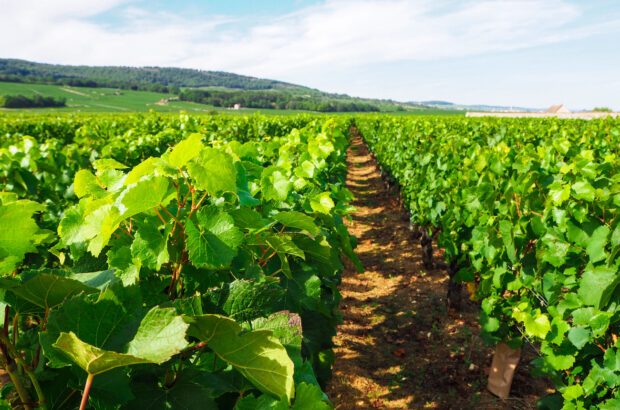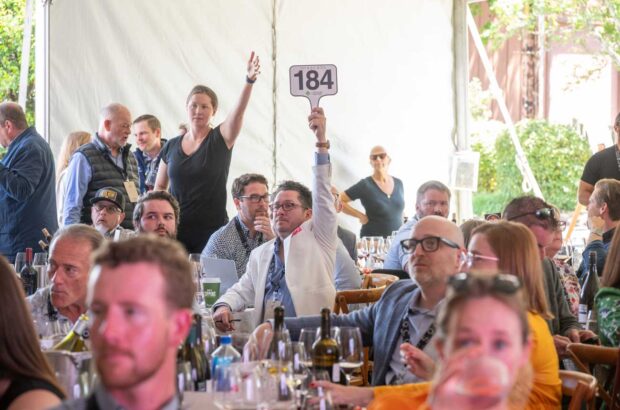The Francs de Pied (Ungrafted Vines) group, which last met two weeks ago at Pasquet’s Liber Pater winery in the Graves, consists of a growing circle of vignerons who work with ungrafted vineyards planted to native varieties.
The list includes Francs de Pied president Loïc Pasquet himself, vice-president Egon Müller (Mosel), and secretary Andrea Polidoro of Cupano (Montalcino) and Contrada Contro (Marche); as well as Gocha Chkhaidze of leading Georgian winery, Askaneli; Thibault Liger-Belair (Burgundy); Chartogne-Taillet (Champagne); Feudi di San Gregorio (Campania); Vida Peter (Hungary); Joh. Jos. Prüm (Germany); Dominio de Es (Spain); Artemis Karamolegos (Greece); St. Jodern Kellerei (Switzerland); and Filipa Pato (Portugal) among others.
‘We had initially thought of organising regular gatherings for wineries who work with ungrafted vines of indigenous varieties, where vignerons could taste each other’s wines and exchange ideas,’ said Polidoro, whose Marche-based Contrada Contro project involves ungrafted Malvasia Bianca di Candia vines trained according to the traditional alberata system. ‘We held the first meeting in January 2020 just before the pandemic, where we had people from France, Spain, Italy, Germany, Greece, and Switzerland.’
In June 2021, the Francs de Pied was officially formed in the Principality of Monaco, under the patronage of Prince Albert II. ‘To achieve UNESCO recognition we need to get a lot of influential people onboard,’ said Pasquet, explaining why the group looked for support from prominent figures such as Prince Albert II of Monaco himself, Georgia president Salomé Zourabichvili, and Italian entrepreneur Pasquale Forte. ‘Ungrafted vines represent a unique heritage that’s as old as wine and we need to preserve it. Wine is not only wine, each bottle contains a lot of spirituality and culture that has been part of humanity for 8000 years… that’s why we need UNESCO recognition.’
UNESCO listing would help increase wine drinkers’ awareness of ungrafted vines’ historical and cultural value. It would also prevent ungrafted vineyards – some of which may date back to pre-phylloxera times – from being uprooted, and would encourage growers to plant new ones, too.
‘EntrepreneurPasquale Forte, an entrepreneur makes wine in Val D’Orcia [Tuscany] but also has ties to Turkey because he has got a company there,’ explained Polidoro. ‘He found at least 100ha of grapevines that are believed to have been propagated from the very vines that the Christians brought to the Holy Land when they were persecuted by Diocletian. These vineyards are often uprooted, often simply because they are deemed unprofitable. If we manage to get them protected by UNESCO, uprooting them would no longer be possible and such a heritage of humanity would be preserved.’
A scientific committee is currently working alongside Francs de Pied to build a case for the UNESCO nomination. Pasquet believes that the process, which entails the examination of a number of ‘vinegrowing traditions all with a vine culture specific to them that needs preserving’, will take at least a couple of years.
In the meanwhile, the winegrowers are also planning to develop a certification programme to help drinkers identify wines made with fruit from ungrafted vines. ‘Our scientific committee will be in charge of certifying the bottles, in a similar way Demeter does for biodynamic wines, with a logo that will be visible on the label,’ said Polidoro.
Not only is the preservation of ungrafted vines aimed at preserving vinegrowing traditions, Polidoro argues that it would represent an effective tool to tackle climate change, too. ‘The rootstock has a big impact on the lifecycle of the vine, as I have noticed that ungrafted vines tend to show a more regular one. From bud break to flowering and veraison, they tend to be very consistent from year to year,’ Polidoro said. ‘Harvest day basically never changes because the plant has its own metabolism that is less influenced by climatic variability and therefore also has a greater adaptability to climate change.’
The Francs de Pied group is set to hold its first official board meeting in March while the “ungrafted vines” certification is expected to be unveiled in September of this year.






